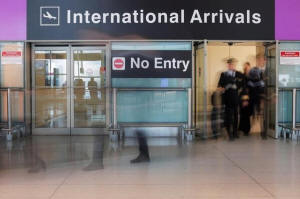|
U.S. appeals court rejects Trump's bid to
bar most refugees
 Send a link to a friend
Send a link to a friend
 [September 08, 2017]
By Mica Rosenberg and Jonathan Stempel [September 08, 2017]
By Mica Rosenberg and Jonathan Stempel
NEW YORK (Reuters) - A U.S. appeals court
on Thursday rejected the Trump administration's effort to temporarily
bar most refugees from entering the country, ruling that those who have
relationships with a resettlement agency should be exempt from an
executive order banning refugees.
A three-judge 9th U.S. Circuit Court of Appeals panel also ruled that
grandparents, aunts, uncles and cousins of legal U.S. residents should
be exempted from President Donald Trump's order, which banned travelers
from six Muslim-majority countries.
The ruling is the latest legal blow to the President's sweeping
executive order barring travelers from Iran, Syria, Libya, Somalia,
Sudan and Yemen for 90 days, which the Republican president said was
necessary for national security.
The Justices said that the government did not persuasively explain why
the travel ban should be enforced against close relatives of people from
the six countries or refugees with guarantees from resettlement
agencies. The 3-0 ruling takes effect in five days.

The U.S. Supreme Court ruled in June that Trump's ban could be
implemented on a limited basis, but should not be applied to people with
"bona fide" relationships to people or entities in the United States.
The government took a narrow view of that interpretation, which the
state of Hawaii challenged in court. A lower court judge sided with
Hawaii, and the 9th Circuit judges upheld that view.
"It is hard to see how a grandparent, grandchild, aunt, uncle, niece,
nephew, sibling-in-law, or cousin can be considered to have no bona fide
relationship with their relative in the United States," the court said.
The court also rejected the administration's argument that the written
assurances provided by resettlement agencies obligating them to provide
services for specific refugees is not a bona fide relationship.
The agencies' advance preparation and expenditure of resources for each
refugee "supports the district court's determination that a bona fide
relationship with the refugee exists," the decision said.
[to top of second column] |

An Iceland Air flight crew arrives on the day that U.S. President
Donald Trump's limited travel ban, approved by the U.S. Supreme
Court, goes into effect, at Logan Airport in Boston, Massachusetts,
U.S., June 29, 2017. REUTERS/Brian Snyder

Trump's first version of the executive order, signed in January,
sparked protests and chaos at airports around the country and the
world before it was blocked by courts. The administration replaced
that version of the ban with a new order in March in response to the
legal challenges.
A Department of Justice spokeswoman said: "The Supreme Court has
stepped in to correct these lower courts before, and we will now
return to the Supreme Court to vindicate the Executive Branch's duty
to protect the Nation."
Hawaii's Attorney General Douglas Chin said the ruling "keeps
families together. It gives vetted refugees a second chance. The
Trump administration keeps taking actions with no legal basis. We
will keep fighting back."
Refugee organizations cheered Thursday's decision, saying it will
give relief to people fleeing violence who were caught in limbo
after the ban.
The broader question of whether the revised travel ban discriminates
against Muslims in violation of the U.S. Constitution will be
considered by the U.S. Supreme Court in October.
(Reporting by Mica Rosenberg and Jonathan Stempel in New York;
Additional reporting by Andrew Chung and Lawrence Hurley in
Washington; editing by Sue Horton and Grant McCool)
[© 2017 Thomson Reuters. All rights
reserved.]
Copyright 2017 Reuters. All rights reserved. This material may not be published,
broadcast, rewritten or redistributed.
 |